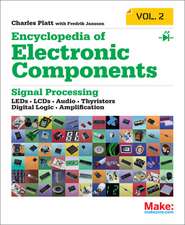High-Level Power Analysis and Optimization
Autor Anand Raghunathan, Niraj K. Jha, Sujit Deyen Limba Engleză Hardback – 30 noi 1997
High-Level Power Analysis and Optimization surveys the state-of-the-art research on the following topics: power estimation/macromodeling techniques for architecture-level designs, high-level power management techniques, and high-level synthesis optimizations for low power.
High-Level Power Analysis and Optimization will be very useful reading for students, researchers, designers, design methodology developers, and EDA tool developers who are interested in low-power VLSI design or high-level design methodologies.
| Toate formatele și edițiile | Preț | Express |
|---|---|---|
| Paperback (1) | 635.47 lei 6-8 săpt. | |
| Springer Us – 21 noi 2012 | 635.47 lei 6-8 săpt. | |
| Hardback (1) | 645.79 lei 6-8 săpt. | |
| Springer Us – 30 noi 1997 | 645.79 lei 6-8 săpt. |
Preț: 645.79 lei
Preț vechi: 759.76 lei
-15% Nou
Puncte Express: 969
Preț estimativ în valută:
123.59€ • 134.20$ • 103.81£
123.59€ • 134.20$ • 103.81£
Carte tipărită la comandă
Livrare economică 23 aprilie-07 mai
Preluare comenzi: 021 569.72.76
Specificații
ISBN-13: 9780792380733
ISBN-10: 0792380738
Pagini: 175
Ilustrații: XIX, 175 p.
Dimensiuni: 178 x 254 x 13 mm
Greutate: 0.57 kg
Ediția:1998
Editura: Springer Us
Colecția Springer
Locul publicării:New York, NY, United States
ISBN-10: 0792380738
Pagini: 175
Ilustrații: XIX, 175 p.
Dimensiuni: 178 x 254 x 13 mm
Greutate: 0.57 kg
Ediția:1998
Editura: Springer Us
Colecția Springer
Locul publicării:New York, NY, United States
Public țintă
ResearchCuprins
1. Introduction.- 1.1 Low power design.- 1.2 Design abstraction and levels of the design hierarchy.- 1.3 Benefits of high-level power analysis and optimization.- 1.4 Book overview.- 2. Background.- 2.1 Sources of power consumption.- 2.2 Methods for reducing power and energy consumption.- 2.3 High-level design techniques.- 2.4 High-level synthesis application domains.- 3. Architecture-Level Power Estimation.- 3.1 Analytical power models.- 3.2 Characterization based activity and power macromodels.- 3.3 Power and switching activity estimation techniques for control logic.- 3.4 Conclusions.- 4. Power Management.- 4.1 Clock-based power management: Gated and multiple clocks.- 4.2 Pre-computation.- 4.3 Scheduling to enable power management.- 4.4 Operand isolation.- 4.5 Power management through constrained register sharing.- 4.6 Controller-based power management.- 4.7 Conclusions.- 5. High-Level Synthesis For Low Power.- 5.1 Behavioral transformations.- 5.2 Module selection.- 5.3 Resource sharing.- 5.4 Scheduling.- 5.5 Supply voltage vs. switched capacitance trade-offs.- 5.6 Optimizing memory power consumption during high-level synthesis.- 5.7 Reducing glitching power consumption during high-level design.- 5.8 Conclusions.- 6. Conclusions And Future Work.- References.
















